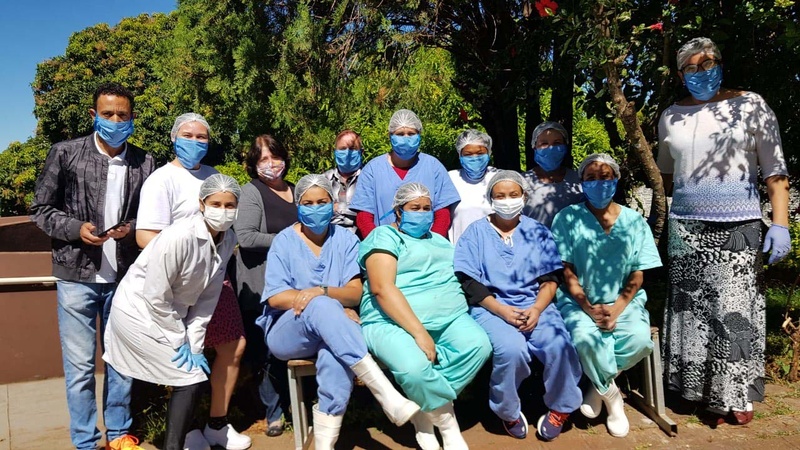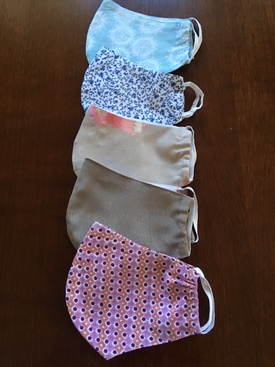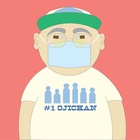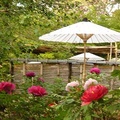A new life in Londrina
It was exactly one year ago that I decided to leave my hometown of São Paulo and move to Londrina, Paraná. I had been retired for 19 years and was already 73 years old. This was the result of a lot of thought.
The reason I decided to move to Londrina is because it is a place where I can trace my roots. The farm that my maternal grandfather built up with hard work remains here as a city block called "Jardim Honda," and it is also the town where my mother spent her youth and where my parents started living after getting married. I don't have many relatives, but my maternal uncle's wife, Hatsuko, and two cousins live here.
I had been hearing about the new coronavirus since January of this year, but I thought it was just a problem of infection spreading in faraway countries. On February 26th, I moved to Londrina without any worries and started a new life.
However, two weeks after moving in, an order to stay home was suddenly issued as a measure against the spread of COVID-19. Renovations had just begun on the room, and there was no sink in the kitchen and no furniture. It would be difficult to live in such a room, so I decided to stay at Hatsuko's house for a while.
I was a bit confused at first, but...
Since I started staying at home, I have seen many instances of people helping each other and showing compassion. I have also had some wonderful experiences because of staying at home. Here, I would like to talk about some of the events and discoveries that moved me.
Hatsuko's stay at home
Hatsuko is a lively and active 81-year-old who goes to the gym and does radio exercises every week, and does her own shopping. However, since the stay-at-home order began, she has occasionally shown signs of depression, her blood pressure has risen, and she has become irritable. Then, every day, she started walking around the neighborhood, saying, "I have to go and check what's going on outside," and talking to people she passed by.
It's not easy to adapt to this new situation. I was worried about Hatsuko.
A few days after the stay-at-home order began, Hatsuko received a call from a longtime acquaintance who said, "We've got some new taro in stock, and my daughter will deliver it to you." That evening, Hatsuko was so excited that she made a delicious boiled taro dish.
As the days went by, Hatsuko began talking on the phone with her friends at the gym, members of her prefectural association, relatives, and wives her age who lived nearby, and her energy gradually began to return.
Now, a woman in the neighborhood calls Hatsuko to say she's on her way, leaves a bag of lemons or avocados in front of her house, and then leaves. Hatsuko's two younger sisters and one of her brothers bring her homemade cakes and bread, mangoes from the garden, and steamed meat buns and sushi rolls that they received as gifts, while Hatsuko herself gives them her prized Chinese cabbage pickles.
To maintain social distance, visitors did not enter the house, kept their masks on, and left without hugs, which is normal for Brazilians. I saw many strange scenes like this. Hatsuko was able to regain her strength thanks to the support of everyone. I thought it was wonderful to see everyone staying at home and deepening their bonds with each other.
An Unexpected Call from the Church
I was a member of the Holiness Church when I lived in Sao Paulo, so I continued to attend the church after moving to Londrina. The Holiness Church was founded in Sao Paulo in 1925 by a pastor from Japan for Japanese immigrants. The Holiness Church in Londrina was established in 1938, and currently has 204 members, of which 181 are Japanese and Japanese-Brazilians.
Everyone at the church in Londrina was very kind and welcomed me with open arms. On Sunday mornings I attend Bible study meetings, and during worship services I listen to the pastor's message in Japanese and sing hymns in Japanese. My native language is Portuguese, but I love hearing about God in Japanese, so it was a fun time. After worship services we have "almoso" lunch, where we eat popular dishes like curry rice and yakisoba and talk about all sorts of things, just like a big family.
However, due to the COVID-19 pandemic, less than a month after we moved, all churches in Londrina were forced to temporarily suspend their activities. Suddenly, my favorite gatherings were canceled. So, hoping that things would return to normal soon, I started listening to the messages of pastors online.
A week and a half after the stay-at-home order began, I received a call from Yahiro Dzirma. "We're starting to make masks at the church. We need a lot of them, so we need someone who can sew with a sewing machine. Laura, can you sew?"
The Londrina Holiness Church has launched a project called "SOS Máscaras" to donate 10,000 masks to hospitals and nursing homes to combat the COVID-19 pandemic.
Although I have been making my own blouses and skirts since I was young, I am not a professional and the masks are for medical use, so at first I thought I couldn't do it, but I was happy to volunteer and participate in the church project to help.
When I told her about the project, Hatsuko, a long-time tailor, offered to help me with my sewing machine and thread. I finished 90 masks in two weeks. With the help of many people, from cutting the material to making the masks, the church was able to reach its goal of donating 10,000 masks.
Later, Hatsuko's sister, who had found out I was making masks, sent me a mask pattern she had seen in the newspaper. It was designed by a Japanese artist in Londrina and said it could be used to make a cloth mask that would fit my face, so I immediately tried making one.
Hatsuko's niece, who works at a hospital, ordered 10 masks for herself and her coworkers. Her cousins also asked for eight masks, saying, "We need them at work." She learned on TV that Londrina was the first city in Brazil to make the use of masks mandatory.
I was happy to be able to help people even if only a little. Thanks to this, I was able to have a memorable experience and my stay at home became more enjoyable.
Bonding with friends
For about four years now, I have been using a smartphone app to send messages to 11 friends every morning. The message is "Good morning. Have a good day," along with a Bible verse and a prayer. In the past, four out of the 11 would always reply, "Thank you for your support. It encourages me." I have been sending messages in the same way since the pandemic began, and now I receive messages filled with compassion from everyone, such as "Thank you so much! I'll do my best today too. Take care, Laura!" The deeper the connections between people, the more the heart is healed. It is very grateful to be able to feel these bonds, especially in times like these, and I would like to continue to cherish them.
© 2020 Laura Honda-Hasegawa






